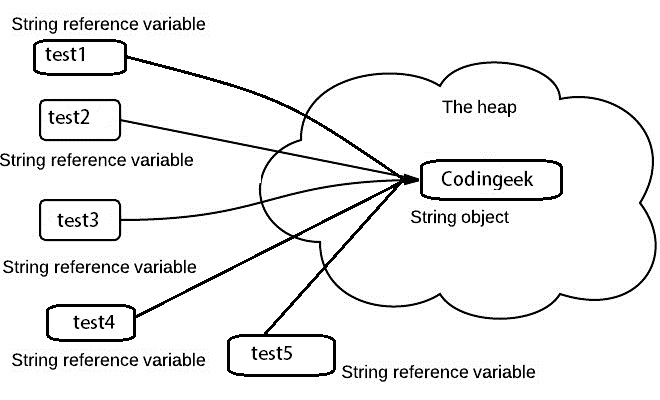Why Are Strings Immutable in Java? Checking Out the Style Decisions
Wiki Article
Immutable Strings: A Trick Part in Ensuring Data Consistency and Reliability
In the world of information administration, the relevance of immutable strings can not be overemphasized. These unchanging sequences of personalities play an essential duty in upholding the honesty and precision of info within systems. By keeping a state of immutability, information uniformity is ensured, promoting a structure of integrity upon which crucial procedures rely. The idea of immutable strings transcends plain formality; it is a linchpin in the complicated internet of information administration. As we explore the benefits, execution strategies, and functional applications of unalterable strings, a clearer picture arises of their vital nature in securing the digital landscape.The Concept of Immutable Strings
Unalterable strings, a fundamental concept in programming, describe strings that can not be customized when they are created. Essentially, as soon as a string worth is designated, any operation that appears to change the string actually produces a new string. This immutability ensures data consistency and reliability in applications, as it prevents unforeseen changes to the initial data.
Benefits in Data Uniformity

Information uniformity is important in numerous elements of software development, including data source monitoring, multi-threaded atmospheres, and distributed systems (Why are strings immutable in Java?). Unalterable strings contribute considerably to achieving this consistency by protecting against data corruption due to simultaneous access. In situations where multiple procedures or strings connect with the exact same data all at once, unalterable strings act as a protect against race problems and synchronization problems
In addition, the immutability of strings simplifies debugging and screening processes. With immutable strings, developers can rely on that once a string is set, it will certainly remain unmodified, making it easier to map the source of mistakes and ensuring that test situations produce consistent outcomes. This integrity in data taking care of eventually causes more secure and robust applications.

Implementing Unalterable Strings
Making sure the immutability of strings needs a thoughtful approach to their application in software growth. When a string item is developed, one crucial method is to develop string courses in a way that stops adjustments. By making strings immutable, designers can enhance information uniformity and reliability in their applications.To carry out immutable strings efficiently, developers must prefer producing new string things rather than customizing existing ones. This practice makes certain that when a string is appointed a value, it can not be transformed. Furthermore, any kind of procedure that shows up to customize the string ought to produce a brand-new string with the preferred changes as opposed to modifying the initial.
Furthermore, using unalterable strings can simplify concurrency management in multi-threaded atmospheres. Given that unalterable strings can not be transformed after creation, they can be safely shared among multiple threads without the danger of information corruption.
Function in Integrity Guarantee
In software development, the usage of immutable strings plays a crucial duty in making sure the integrity of information procedures. Unalterable strings, when developed, can not be modified, ensuring that the data they represent remains constant throughout the application's execution. This immutability building provides a level of guarantee that the information being refined will not be accidentally altered, causing unforeseen results or errors in the system.By including unalterable strings right into software program style, designers can enhance the reliability of their applications by decreasing the risks connected with mutable information - Why are strings immutable in Java?. Unalterable strings help in preventing information corruption or unplanned adjustments, which can be specifically essential when managing delicate info or when data honesty is paramount
Furthermore, the usage of immutable strings streamlines concurrent handling, as several strings can safely accessibility and share string data without the threat of one thread modifying the material while an a knockout post additional reads it. This element adds considerably to the total dependability of the software system, making sure predictable and regular habits in data taking care pop over here of procedures.
Applications and System Assimilation
The smooth combination of immutable strings right into numerous applications and systems is crucial for making sure durable information uniformity and dependability across diverse technical environments - Why are strings immutable in Java?. Immutable strings play a critical duty in improving the honesty of information exchanges and communications within complex software program communities. By incorporating immutable strings into applications, developers can reduce the threats associated with information tampering, unapproved modifications, and unintended alterations, thereby fortifying the general security posture of the systemIn the context of system integration, immutable strings function as a fundamental element for developing secure communication networks and promoting seamless data transfers in between various parts. Their unalterable nature guarantees that data transmitted in between systems remains unchanged and verifiable, lowering the likelihood of incongruities or mistakes that could endanger the stability of the entire system. Additionally, unalterable strings can enhance interoperability in between diverse systems by giving a standard layout for information representation, allowing a lot more reliable data processing and exchange protocols across interconnected platforms. By taking on unalterable strings in applications and system assimilation procedures, organizations can fortify their data infrastructure and maintain the reliability and consistency of their info assets.
Final Thought
Finally, immutable strings play an important duty in preserving data uniformity and integrity in various applications and system assimilations. By making sure that strings can not be changed once produced, the stability of data is preserved, minimizing browse around this web-site the risk of errors and disparities. Executing immutable strings can dramatically boost the integrity of systems, ultimately leading to even more trustworthy and exact information handling.
Report this wiki page